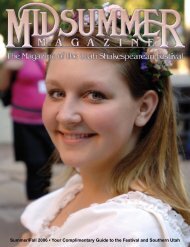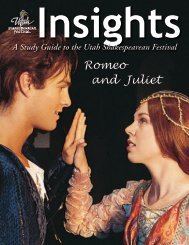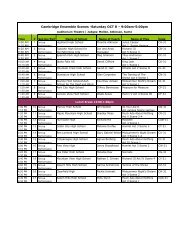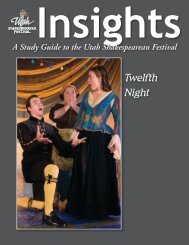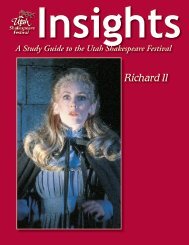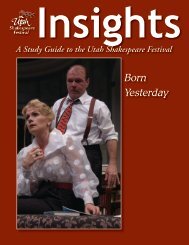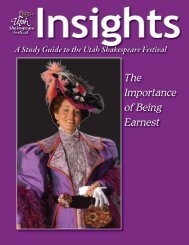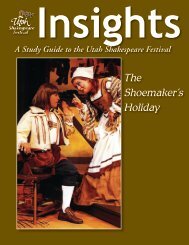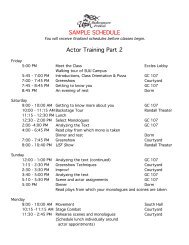The Tempest - Utah Shakespearean Festival
The Tempest - Utah Shakespearean Festival
The Tempest - Utah Shakespearean Festival
You also want an ePaper? Increase the reach of your titles
YUMPU automatically turns print PDFs into web optimized ePapers that Google loves.
10<br />
Shakespeare’s Language<br />
Many students—and adults for that matter—find Shakespeare difficult to read and hard<br />
to understand. <strong>The</strong>y accuse him of not speaking English and refuse to believe that ordinary<br />
people spoke the way his characters do. However, if you understand more about his language,<br />
it is easier to understand. One idea that may help to remember that his plays are written in<br />
two forms: prose and verse. In <strong>The</strong> <strong>Tempest</strong> prose and verse are both used extensively.<br />
Prose<br />
Prose is the form of speech used by common people in <strong>Shakespearean</strong> drama. <strong>The</strong>re is<br />
no rhythm or meter in the line. It is everyday language. Shakespeare’s audience would<br />
recognize the speech as their language. <strong>The</strong>se are characters such as murderers, servants,<br />
and porters. However, many important characters can speak in prose. <strong>The</strong> majority of <strong>The</strong><br />
Merry Wives of Windsor is written in prose because it deals with middle-class. Caliban speaks<br />
prose when he is conspiring with Stefano and Trinculo, but when Caliban speaks of the<br />
beauty of the island he speaks in verse.<br />
For example, these lines are in prose:<br />
Caliban Thou dost me yet but little hurt; thou wilt anon, I know it by thy<br />
trembling. Now Prosper works upon thee.<br />
Stephano Come on your ways. Open your mouth; here is that which will give<br />
language to you, cat. Open your mouth; this will shake your shaking,<br />
I can tell you, and that soundly. You cannot tell who’s your friend.<br />
Open your chaps again (2.2.79-86).<br />
And these lines are in verse:<br />
Caliban Be not afeard, the isle is full of noises,<br />
Sounds, and sweet airs, that give delight and hurt not.<br />
Sometimes a thousand twangling instruments<br />
Will hum about mine ears; and sometimes voices,<br />
That if I then had wak’d after long sleep,<br />
Will make me sleep again (3.2.135–140).<br />
In the first passage, Stephano is feeding Caliban wine in order to calm his fits. Caliban<br />
is explaining Prospero’s powers to Stephano and Trinculo. Because there is no rhyme or<br />
rhythm, and the text flows without concern of where the line ends on the page, we recognize<br />
the passage as prose. Consequently, we can tell that Caliban and the Stephano are commoners<br />
who speak the language of an Elizabethan audience member. In the second passage,<br />
Caliban speaks of the beauty of the island in verse.<br />
Verse<br />
<strong>The</strong> majority of Shakespeare’s plays are written in verse. A character who speaks in verse<br />
is a noble or a member of the upper class. Most of Shakespeare’s plays focused on these<br />
characters. <strong>The</strong> verse form he uses is blank verse. It contains no rhyme, but each line has an<br />
internal rhythm with a regular rhythmic pattern. <strong>The</strong> pattern most favored by Shakespeare<br />
is iambic pentameter. Iambic pentameter is defined as a ten-syllable line with the accent on<br />
every other syllable, beginning with the second one. <strong>The</strong> second line of this speech is the<br />
only line that follows strict iambic pentameter.<br />
For example:<br />
Prospero “You do look, my son, in a mov’d sort,<br />
As if you were dismay’d; be cheerful, sir.<br />
<strong>Utah</strong> <strong>Shakespearean</strong> <strong>Festival</strong><br />
351 West Center Street • Cedar City, <strong>Utah</strong> 84720 • 435-586-7880



